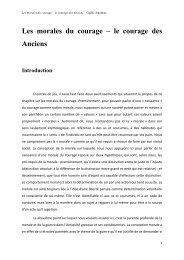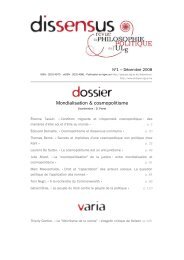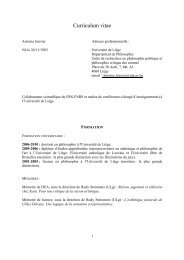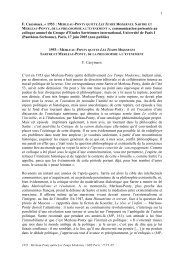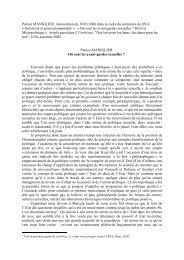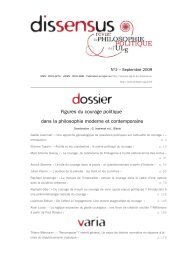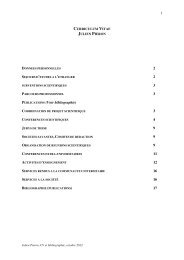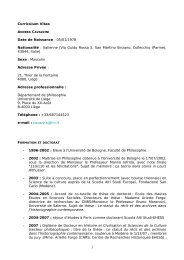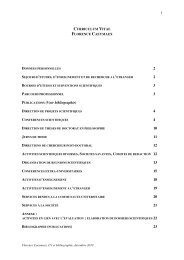Subjectivations politiques et économie des savoirs - Service de ...
Subjectivations politiques et économie des savoirs - Service de ...
Subjectivations politiques et économie des savoirs - Service de ...
You also want an ePaper? Increase the reach of your titles
YUMPU automatically turns print PDFs into web optimized ePapers that Google loves.
– Revue <strong>de</strong> philosophie politique <strong>de</strong> l’ULg – N°5 – Mai 2013 – p. 138<br />
education and censorship: it also called for laws against luxury, the close supervision<br />
of commerce, and various state measures aimed at minimizing growth, inequality and<br />
the worship of money. With regards to the latter, Socrates was unmistakably clear: « it<br />
is impossible for a city to honor wealth and at the same time for its citizens to acquire<br />
mo<strong>de</strong>ration » (Republic 555d).<br />
That a city aiming at mo<strong>de</strong>ration should concern itself so much with wealth is hardly<br />
surprising: as we noted above, the lust for money is the most powerful <strong><strong>de</strong>s</strong>ire according<br />
to Plato. But what is more surprising is the fact that relatively few political theorists<br />
have taken up Plato’s treatment of property, commerce and redistribution. 55<br />
This is<br />
particularly puzzling given that so much is at stake here according to Plato, both<br />
<strong>et</strong>hically and politically. First, the regulation of wealth and the restraining of our lust for<br />
money have great sway over peace and stability – not only within a city, but also<br />
b<strong>et</strong>ween cities. It is Glaucon’s <strong><strong>de</strong>s</strong>ire for <strong>de</strong>licacies (and thus wealth) that ultimately<br />
leads to war and empire in the feverish city, and it is an uncontrolled app<strong>et</strong>ite for<br />
money that is at the root of most regimes’ corruption in Book VIII. The close<br />
connections b<strong>et</strong>ween wealth, imperialism, <strong>de</strong>ca<strong>de</strong>nce, and bloodshed are not merely<br />
<strong>de</strong>picted in the Republic, but also in the Laws, Gorgias and Phaedo. In the latter,<br />
Socrates is remarkably blunt, affirming that « all wars are due to the <strong><strong>de</strong>s</strong>ire to acquire<br />
wealth » (66b).<br />
A second argument ma<strong>de</strong> by Plato for the need to mo<strong>de</strong>rate our <strong><strong>de</strong>s</strong>ire for money (and<br />
consumption) is that these <strong><strong>de</strong>s</strong>ires distract us from caring for things that truly matter<br />
for the good life (Phaedo 82c; Republic 561d-562c). Thirdly, Plato insists that good<br />
morals and civic friendship are unattainable without mo<strong>de</strong>rating our acquisitiveness. A<br />
city full of money-lovers is one where « everybody is out for himself… it doesn’t matter<br />
wh<strong>et</strong>her som<strong>et</strong>hing is sanctioned by heaven, or forbid<strong>de</strong>n and absolutely disgusting –<br />
it’s all the same to them, and causes not the slightest scruple » (Laws 831c). If sharing<br />
is an essential aspect of good citizenship, it is obviously much har<strong>de</strong>r to do when one<br />
is obsessed not only with acquisition but also with « outdoing others » (pleonexia). As<br />
Malcolm Schofield rightly observes, the problem with greed is not only that it entails a<br />
constant <strong><strong>de</strong>s</strong>ire for more, but more problematically, that it entails a <strong><strong>de</strong>s</strong>ire to have<br />
more than others. 56<br />
As such, greed inevitably raises complex issues of justice and<br />
injustice – as Ryan Balot has persuasively shown. 57<br />
Plato points to this extremely<br />
significant political problem by having Socrates gently chastise Callicles for suggesting<br />
55<br />
56<br />
57<br />
Recent exceptions: R. Balot, Greed and Injustice in Classical Athens, op. cit. ; E. Nelson, The Greek<br />
Tradition in Republican Thought, Cambridge, Cambridge University Press, 2004; M. Schofield, Plato,<br />
Oxford, Oxford University Press, 2006.<br />
M. Schofield, Plato, p. 278.<br />
R. Balot, Greed and Injustice in Classical Athens, op. cit.



